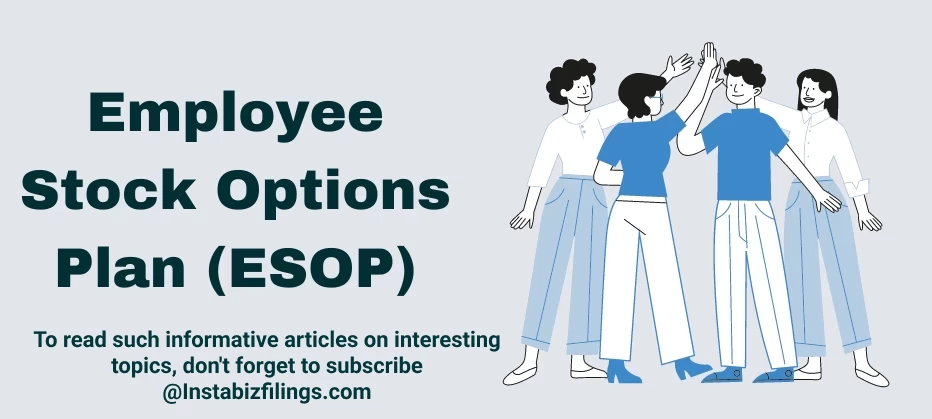
Companies Act
ESOP
Employee Stock
The Employee Stock Option Plan: Empowering Employees for Ownership
July 12, 2023 by Team Instabizfilings
- The Employee Stock Option Plan (ESOP) is a valuable employee benefit plan designed to foster employee ownership within a company. It allows companies to offer shares to their employees at discounted rates, encouraging a sense of ownership and commitment. ESOPs can be issued by any company, with different guidelines for listed and non-listed companies. Non-listed companies must adhere to the Companies Act, 2013 and Companies (Share Capital and Debentures) Rules, 2014, while listed companies must follow the Securities Exchange Board of India (SEBI)
Employee Stock Option Scheme Guidelines. - Under Section 2(37) of the Companies Act, 2013, an employee stock option refers to the right given to directors, employees, or officers of the company, its holding or subsidiary company, to purchase, benefit from, or subscribe to company shares at a predetermined price on a future date. Essentially, ESOPs allow companies to increase their subscribed share capital by issuing additional shares to employees at a predetermined rate.
- ESOPs offer significant benefits to both companies and employees, particularly startups where employees can be rewarded after the company goes public. Any eligible employee can be offered an ESOP based on specific criteria.
- ESOPs can be issued to permanent employees working in India or abroad, directors (including whole-time or part-time directors, excluding independent directors), and employees or directors of subsidiary, holding, or associate companies. There are certain restrictions on issuing ESOPs to employees belonging to the promoter group, directors holding more than ten percent equity shares, or their relatives. However, these restrictions do not apply to startup companies for ten years from their incorporation date.
- The issuance process of ESOPs is governed by Section 62(1)(b) of the Companies Act, 2013 and Rule 12 of Companies (Share Capital and Debentures) Rules, 2014. This process is similar to that outlined in the Securities and Exchange Board of India Employee Stock Option Scheme Guidelines for listed companies. The steps involved in issuing ESOPs include preparing the draft scheme, convening board and general meetings, passing resolutions, filing necessary forms with the Registrar of Companies, and sending options to employees, directors, and officers of the company. Private companies must ensure that their Articles of Association authorizes the issuance of shares through ESOP and, if not, amend them accordingly.
- ESOPs have three key stages: grant, vest, and exercise. Grant refers to the issuance of stocks to employees, notifying them of their eligibility for ESOPs. Vesting is the right of employees to apply for the shares granted to them, typically with a minimum one-year gap between grant and vesting. Exercise is the period in which employees can exercise their option to purchase shares, with the company having the freedom to specify any lock-in periods for the shares.
- During the issuance of ESOPs, companies are required to disclose certain information in the explanatory statement attached to the special resolution. This includes the total number of stock options to be granted, eligible employee classes, vesting period requirements, exercise price and process, lock-in periods (if applicable), maximum number of options per employee, methods used to value options, conditions for lapsing options, and a commitment to comply with applicable accounting standards.
Disclaimer
The information provided in this blog is purely for general informational purposes only. While every effort has been made to ensure the accuracy, reliability and completeness of the content presented, we make no representations or warranties of any kind, express or implied, for the same.
We expressly disclaim any and all liability for any loss, damage or injury arising from or in connection with the use of or reliance on this information. This includes, but is not limited to, any direct, indirect, incidental, consequential or punitive damage.
Further, we reserve the right to make changes to the content at any time without prior notice. For specific advice tailored to your situation, we request you to get in touch with us.

Need more details? We can help! Talk to our experts now!
Start Your Business Registration – Talk to Our Experts Now!

Still Confused?
Talk to experts? Fill in the information and we will reach out in 24 Working Hours.

